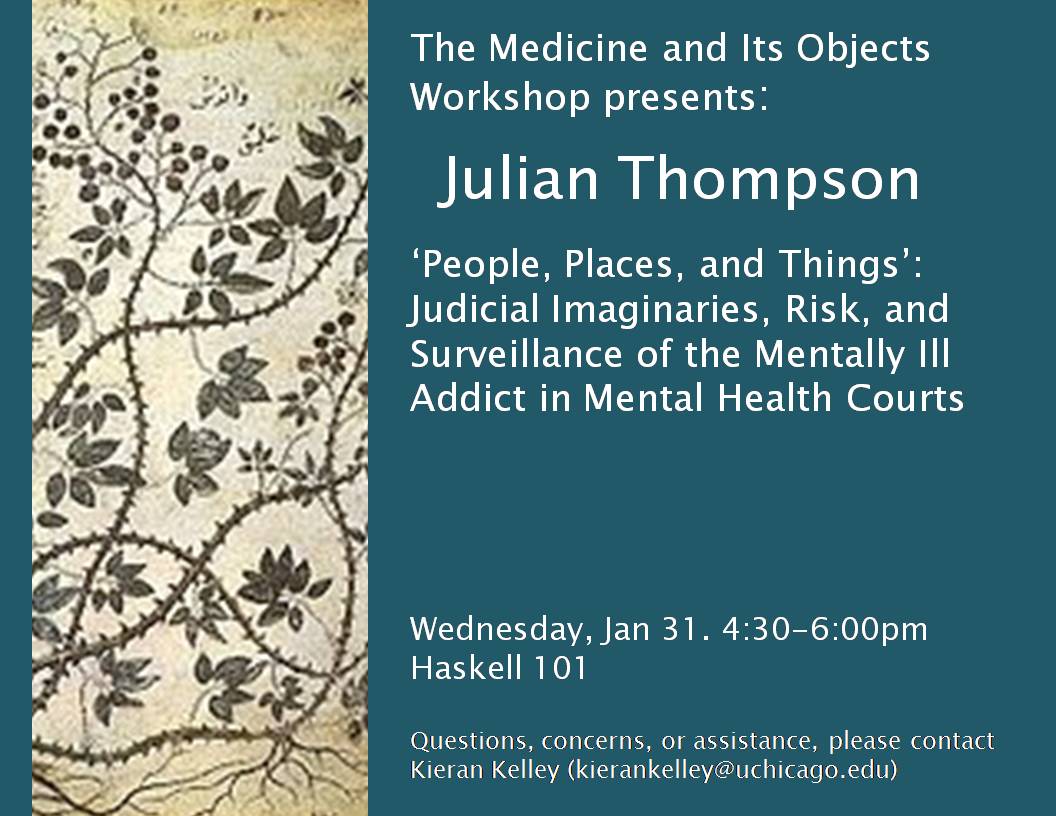Wednesday, January 31, 4:30-6:00pm. Haskell 101
The Medicine and Its Objects Workshop presents: Julian Thompson (SSA):
‘People, Places, and Things:’ Judicial Imaginaries, Risk, and Surveillance of the Mentally Ill Addict in Mental Health Courts
with opening comments by Katie Schumacher (SSA)
Mental health courts (MHCs) operate at the nexus of legal, medical, and welfare borders, often articulating themselves as rehabilitative alternatives to incarceration by offering supervised treatment in the community. As such, they provide a unique window into the micro-processes and practices of contemporary rehabilitation efforts, especially after forty years of punitive approaches to crime control. While many empirical studies have examined their effectiveness, few studies have ethnographically investigated the courtroom dynamics that make possible their rehabilitative aims. In this paper, I attempt to highlight one aspect of MHCs’ rehabilitative logic—and by extension, its ideological work. This logic revolves around several practices that focus on both imagined and real constructions of ‘risk’ among people diagnosed with a serious mental illness and co-occurring substance use and the attendant social ecology of their categorical existence (i.e. addiction, illness, criminality). Rather than radically critiquing and deconstructing these legal and psychiatric categories, I examine how they are imagined and instantiated in the court context, assigned meaning, and become real targets in the judicial process—a process that is inextricably bound up in latent and manifest punishment. Here, the often taken-for-granted saying “people, places, and things” within the addiction community holds significance. When MHC practitioners work within this folk understanding of addiction, gender and racial ideologies emerge and meld with a pre-configured addict type—an addict type that already at the core is a risk-prone subject. As a result, MHCs focus their efforts on restructuring defendants’ environments, social life, and routine activities in order to restructure the thinking and behavior of defendants. According to the rationale of MHC practitioners, the restructuring process is therapeutic and punishment is merely an instrument to achieve rehabilitation. While the causes, conditions, and consequences of this process vary, what remains consistent is the conception of the defendant as a risk subject whose prior drug use defines the totality of his or her life and justifies the hyper-surveillance of the court—often to the detriment of defendants’ material stability.
To receive the paper, or if you have any questions or require assistance to attend, email the workshop coordinator: Kieran Kelley (kierankelley@uchicago.edu)
To subscribe to our mailing list, visit: https://lists.uchicago.edu/
